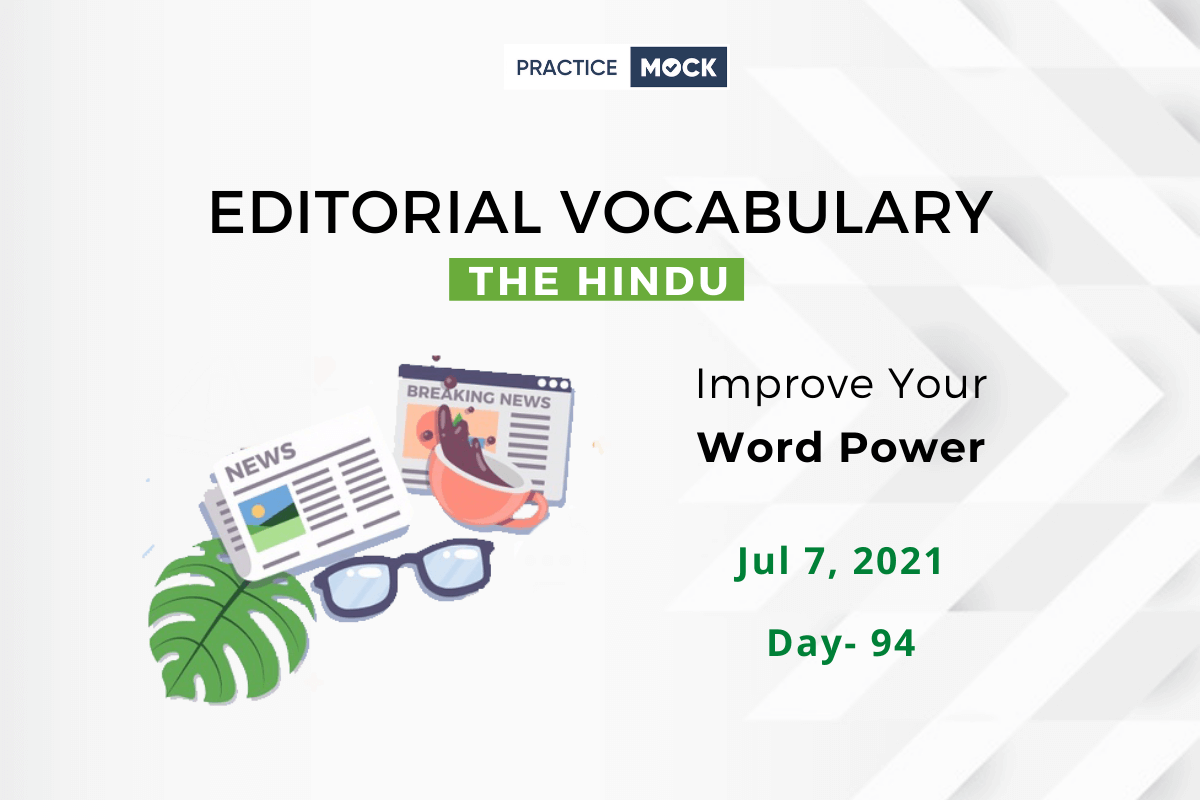We hope that these editorial articles are helping you in your exam preparation. This series of Editorials’ Difficult Words will help you to understand the editorials of The Hindu in a better way. Today we have come up with the explanation of difficult words/phrases of the below editorial. Have a look and update your word power & general awareness by going through this editorial.
| Difficult Word/ Phrase | Contextual Sense |
| Foretell | predict (the future or a future event) |
| Oppression | prolonged cruel or unjust treatment or control |
| Tenuous | very weak or slight |
| Cling | hold on tightly to |
| Diffident | modest or shy because of a lack of self-confidence |
| Spell | be a sign or characteristic of |
| Perversely | in a manner contrary to what is expected or accepted |
| Incarceration | the state of being confined in prison; imprisonment |
| Sipper | drinking straw |
| Commemorative | acting as a memorial or mark of an event or person |

A death foretold (predict (the future or a future event)): On activist Stan Swamy’s death
There is a pattern of institutional oppression (prolonged cruel or unjust treatment or control) behind the demise of Father Stan Swamy
It was a death his well-wishers feared would happen and one he had anticipated. Father Stan Swamy, an 84-year-old Jesuit priest, known for his service and activism in the cause of Adivasis, died nine months into his unjust imprisonment on tenuous (very weak or slight) charges. A death that was simply allowed to happen despite being foretold by his deteriorating health in prison will weigh on the country’s collective conscience for long. His age and frailty drew no sympathy from either the prosecuting agency or the trial court, which clung (hold on tightly to) to the state narrative of there being grounds to believe that he was part of a Maoist plot to overthrow the government. Despite being a fit case for bail, he was denied bail, mainly due to the statutory bar on bail under the anti-terrorism law invoked against him. The best the diffident (modest or shy because of a lack of self-confidence) judiciary could do for him was a spell (be a sign or characteristic of) of hospitalisation, even as the octogenarian pleaded that he be given interim bail to be with his friends or allowed to die in prison. The Bombay High Court did issue notice on his bail petition, observing that he was entitled to bail, but his end came in a hospital even before the matter could be taken up for final disposal. Much of the blame and accountability for his death should be on the NIA, which perversely (in a manner contrary to what is expected or accepted) opposed his release, and the court which could have granted interim bail weeks earlier.

It was fairly obvious that his prison stay, especially during the pandemic, was detrimental to his well-being. A good two months elapsed between the High Court seeking the NIA’s response to his bail plea on medical grounds and his death. The same court had intervened to grant interim bail to Varavara Rao, another elderly co-accused, holding that bail can be granted “purely on the grounds of sickness, advanced age, infirmity and health conditions”, especially if incarceration (the state of being confined in prison; imprisonment) amounted to endangering life. It is systemic and institutional failure that another undertrial placed in similar circumstances did not get the benefit of this humane approach. A pattern of institutional oppression can be seen in the events, from the denial of a sipper (drinking straw) in jail to his death while in custody. Two larger issues here are the questionable legality of the bail-denying feature of the Unlawful Activities (Prevention) Act and the validity of the Bhima-Koregaon case itself. It is time the higher judiciary examined these; especially the attempt to link a simple case arising out of violence a day after the Elgar Parishad, a commemorative (acting as a memorial or mark of an event or person) event held in Pune, and an alleged Maoist plot involving lawyers, activists and human rights defenders. To make matters worse, credible reports that some of the electronic evidence gathered in this case could have been planted remotely by malware were never investigated. The call for accountability for Fr. Swamy’s death rings painfully true.

Hope you got to know some new words/phrases which will definitely be useful in the English section of upcoming competitive exams. Wishing you all the best for your preparation!
Want to improve your vocabulary further? Download the Lists of Word-Meanings of Previous Months here.
- Sign Up on Practicemock for Updated Current Affairs, Free Topic Tests and Free Mini Mocks
- Sign Up Here to Download Free Study Material
Free Mock Tests for the Upcoming Exams
- IBPS PO Free Mock Test 2024
- RBI Grade B Free Mock Test 2024
- IBPS SO Free Mock Test 2024
- NABARD Grade A Free Mock Test 2024
- SSC CGL Free Mock Test 2024
- IBPS Clerk Free Mock Test 2024
- IBPS RRB PO Free Mock Test 2024
- IBPS RRB Clerk Free Mock Test 2024
- RRB NTPC Free Mock Test 2024
- SSC MTS Free Mock Test 2024
- SSC Strenographer Free Mock Test 2024
- GATE Mechanical Free Mock Test 2024
- GATE Civil Free Mock Test 2024
- RRB ALP Free Mock Test 2024
- SSC CPO Free Mock Test 2024
- AFCAT Free Mock Test 2024
- SEBI Grade A Free Mock Test 2024
- IFSCA Grade A Free Mock Test 2024
- RRB JE Free Mock Test 2024
- Free Banking Live Test
- Free SSC Live Test



